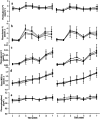Caffeine supplementation is ergogenic in soccer players independent of cardiorespiratory or neuromuscular fitness levels
- PMID: 32513182
- PMCID: PMC7282184
- DOI: 10.1186/s12970-020-00360-x
Caffeine supplementation is ergogenic in soccer players independent of cardiorespiratory or neuromuscular fitness levels
Abstract
Background: Equivocal findings examining the influence of caffeine on performance and biological responses to exercise may be due to inter-individual variability in cardiorespiratory or neuromuscular fitness. This study examined whether the effects of caffeine ingestion on exercise performance and biological responses to prolonged intermittent exercise to exhaustion depend on cardiorespiratory or neuromuscular fitness.
Methods: Twenty male soccer players, separated according to either cardiorespiratory fitness (high vs medium) or neuromuscular fitness (high vs medium) underwent two trials simulating the cardiovascular demands of a soccer game to exhaustion on treadmill after ingesting either caffeine (6 mg∙kg- 1) or placebo. Physical performance, cardiorespiratory and metabolic parameters and blood metabolites were evaluated.
Results: Time to exhaustion (719 ± 288 vs 469 ± 228 s), jump height (42.7 ± 4.2 vs 38.6 ± 4.4 cm), heart rate (163 ± 12 vs 157 ± 13 b∙min- 1), mean arterial blood pressure (98 ± 8 vs 92 ± 10 mmHg), plasma glucose (5.6 ± 0.7 vs 5.3 ± 0.6 mmol∙l- 1) and lactate (3.3 ± 1.2 vs 2.9 ± 1.2 mmol∙l- 1) were higher, while rating of perceived exertion (12.6 ± 1.7 vs 13.3 ± 1.6) was lower with caffeine vs placebo (p < 0.01), independent of cardiorespiratory or neuromuscular fitness level. Reaction time; plasma glycerol, non-esterified fatty acids and epinephrine; carbohydrate and fat oxidation rates; and energy expenditure were not affected by caffeine (p > 0.05).
Conclusions: Caffeine was effective in improving endurance and neuromuscular performance in athletes with either high or medium cardiorespiratory and neuromuscular fitness. Cardiorespiratory and neuromuscular fitness do not appear to modulate the ergogenic effects of caffeine supplementation in well-trained athletes.
Keywords: Biochemical responses; Endurance performance; Ergogenic aid; Explosiveness.
Conflict of interest statement
The authors declare that they have no competing interests.
Figures



References
-
- Grigic J, Mikulic P. Caffeine ingestion acutely enhances muscular strength and power but not muscular endurance in resistance-trained men. Eur J Sport Sci. 2017;17(8). 10.1080/17461391.2017.1330362. - PubMed
MeSH terms
Substances
LinkOut - more resources
Full Text Sources
Medical
